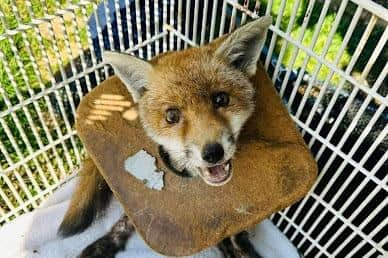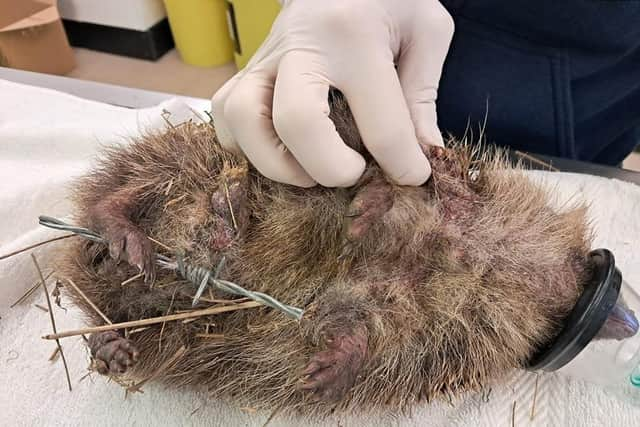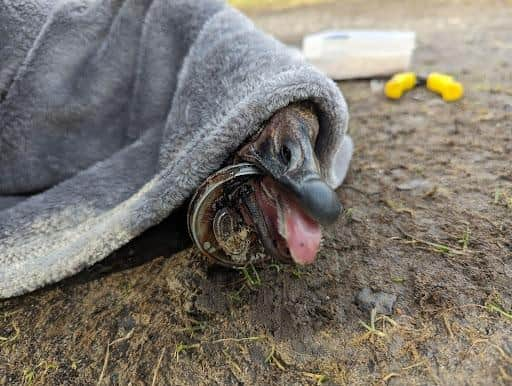'Carelessly discarded litter' blamed for animal deaths: Concerning figures for Sussex revealed
and live on Freeview channel 276
The RSPCA said it has received almost 13,000 reports about animals found ‘severely injured, trapped, mutilated, choked or even dead’ from ‘carelessly discarded litter; over the past four years.
And out of all the counties in England and Wales, East Sussex took seventh place in the league of litter-related animal incidents with 399 reported to the RSPCA over that time period.
Advertisement
Hide AdAdvertisement
Hide AdWest Sussex wasn’t far off the top ten, with 283 incidents reported.


An RSPCA spokesperson said: “The shocking new data also reveals that it received an average of 13 reports per day last year during the peak months of May, June, July and August, when there is a particular litter hazard for animals.
“Now – the RSPCA is urging people to help ‘create a better world for every animal’ by getting involved in Keep Britain Tidy’s Great British Spring Clean’ (from March 15 to 31).
"Individuals, groups or schools can pledge their support - and say how many bags of litter they intend to pick up - with more than 400,000 collected in total last year.”
Advertisement
Hide AdAdvertisement
Hide Ad‘Distressing incidents’ dealt with by the RSPCA include: a hedgehog entangled in old barbed wire; a fox cub with litter caught round his neck; a goose with an old drinks can stuck to her lower beak; and a Great Black Backed Gull whose leg became ‘almost completely detached’ due to old fishing line cutting in.


The spokesperson added: “Amongst mammals, litter-related reports to the RSPCA were highest for foxes, hedgehogs and deer, while among wild birds, swans, pigeons and gulls bore the greatest brunt of discarded rubbish. The RSPCA even received reports of family pets such as cats and dogs being affected by litter.”
The ten counties with the biggest litter problem, based on reports to the RSPCA over four years, were: Greater London (1,439), Devon (594), Kent (526), Greater Manchester (500), West Midlands (437), Essex (428), East Sussex (399), Hampshire (395), Merseyside (362) and Cornwall (300).
RSPCA anti-litter campaigns manager Carrie Stones said: “Our rescuers deal with thousands of avoidable incidents every year where animals have been impacted by litter.
Advertisement
Hide AdAdvertisement
Hide Ad“Old drinks cans and bottles, plastic items and even disposable vapes are just some of the items that pose a danger to our wildlife - including hedgehogs, deer and foxes. Animals can ingest the litter or become entangled, leading to injuries, mutilations and even death.


“Sadly, for every animal we’re able to help there are probably many others that go unseen, unreported and may even lose their lives.
“But the public can help us protect animals, and avoid these incidents happening in the first place.
“Spring is an ideal time to go on a litter-pick because it falls before the breeding season when young animals such as fox cubs are at risk of getting into trouble, while litter in hedges will be more visible to pickers before the vegetation really starts growing. That’s why we’re calling on the public to get involved in the Great British Spring Clean to help remove litter that may endanger animals.
Advertisement
Hide AdAdvertisement
Hide Ad“But it’s also really easy for the public to help at all times of the year. When people are out and about, we urge them to hold on to their litter until there is an opportunity to dispose of it safely and responsibly - or recycle where appropriate. As we all strive to create a better world for every animal, this could save an animal’s life.“
The charity has asked anyone who finds a small sick or injured wild animal to take it to the vets, so ‘they can get help quickly’. Find out more here.
The RSCPA added: “Every time a wild animal is helped by the public it frees up our vital specialist rescuers to reach animals suffering heart-breaking cruelty and neglect, a job no other charity does.
"This year the RSPCA celebrates its 200th birthday. To mark this special anniversary the animal welfare charity wants to inspire one million people to join their movement to improve animals' lives. To find out how you can join their million-strong movement for animals visit www.rspca.org.uk/200.”